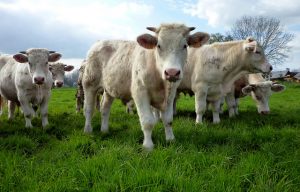Organic grass-fed beef has less environmental impact than non-organic grass-fed beef
 Photo credit:Stanze
Photo credit:Stanze
A recent study published in the Journal of Cleaner Production assessed the environmental impacts of organic grass-fed beef and non-organic grass-fed beef production. Researchers used a lifecycle analysis to analyze data collected from one grass-fed farm prior to conversion to organic and then after its conversion to organic, as well as data from conventional non-grass-fed farms. They found that organic and non-organic grass-fed beef production practices were more environmentally friendly than conventional production, with reduced impact on acidification, eutrophication (over-growth of algae and decrease of oxygen in bodies of water due to nutrient runoff), and energy consumption. The global warming potential for organic grass-fed beef and conventional beef was not statistically different, although both out-performed non-organic grass-fed beef production. Overall, the study found that organic grass-fed beef production has fewer environmental impacts than both conventional beef and non-organic grass-fed beef production.

